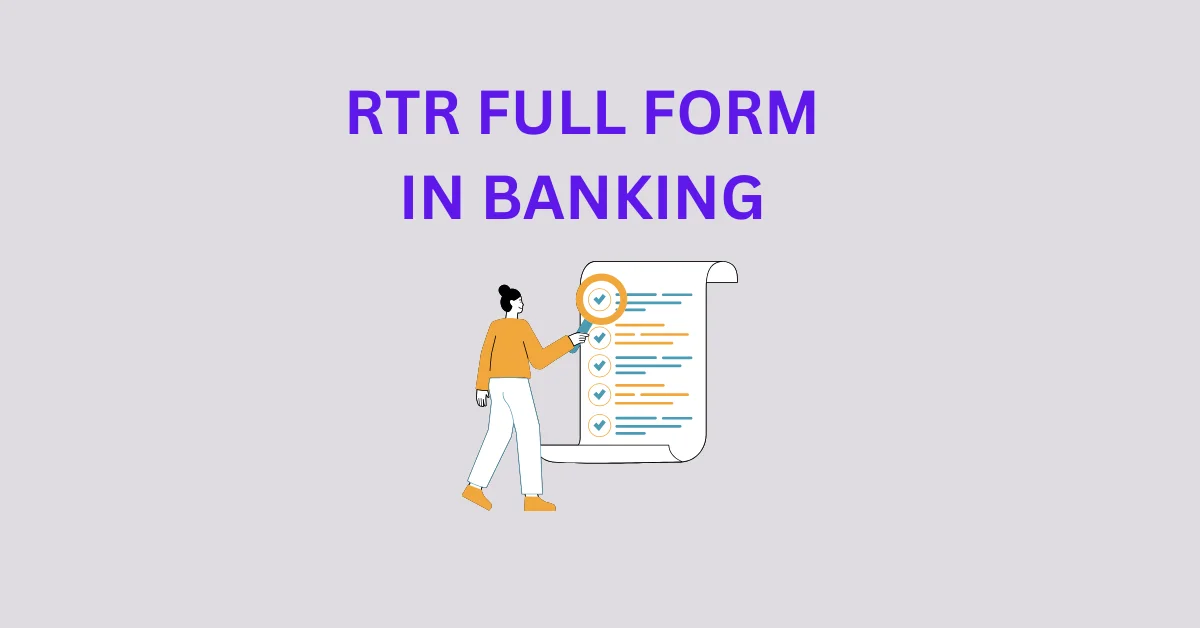In this article we will provide the information related to the RTR full form in banking and the meaning and implications of RTR in the banking realm.
In the intricate world of banking, acronyms and abbreviations often dominate the landscape. One such acronym, RTR full form, holds significant importance, standing as a key determinant in the evaluation of a borrower’s financial standing.
RTR FULL FORM: REPAYMENT TRACK RECORD
At its core, RTR in banking stands for Repayment Track Record. This encapsulates a comprehensive record documenting a borrower’s history of repaying loans or debts.
It serves as a crucial tool for banks and financial institutions, aiding them in assessing the creditworthiness of individuals and deciphering their ability to meet repayment obligations.
ASSESSING CREDITWORTHINESS THROUGH RTR
The fundamental premise underlying the significance of RTR lies in its role as a risk assessment metric.
A borrower endowed with a commendable Repayment Track Record is perceived as a lower risk for lenders.
This perception is rooted in the borrower’s consistent history of making timely payments on their debts, showcasing financial responsibility.
Conversely, a borrower grappling with a poor RTR raises red flags for lenders. A history marred by missed payments or defaults on debts indicates a higher risk profile.
Lenders, in their risk mitigation strategies, view such borrowers with caution, necessitating a thorough evaluation of their financial stability.
FACTORS CONTRIBUTING TO RTR ASSESSMENT
The assessment of RTR full form (Repayment Track Record) involves a multifaceted analysis, considering various factors to paint a holistic picture of the borrower’s financial health.
- Credit Scores and Reports
Credit Scores:
Lenders often scrutinize credit scores as a pivotal component of RTR assessment. A higher credit score reflects a borrower’s responsible handling of credit, positively influencing their RTR.
Credit Reports:
Detailed credit reports offer insights into a borrower’s credit utilization, outstanding debts, and payment history, contributing significantly to RTR evaluation.
- Payment History
A meticulous examination of a borrower’s history of payments on previous loans or credit accounts is integral to RTR assessment. Consistent and timely payments enhance the borrower’s credibility.
- Additional Financial Parameters
Income:
The borrower’s income is a critical parameter, providing context to their repayment capacity. A stable and substantial income positively impacts RTR.
Employment Status:
Job stability and a secure employment status contribute to the perception of financial reliability.
Financial Stability:
The overall financial stability of the borrower, encompassing assets, liabilities, and financial habits, plays a pivotal role in RTR evaluation.
ALSO READ:
HOW TO CHECK BHOOMI RTC KARNATAKA LAND RECORDS
BORROWER RESPONSIBILITIES: MANAGING RTR
Given the far-reaching implications of RTR on one’s creditworthiness, borrowers bear a significant responsibility in managing this track record.
- Timely Payments
Making timely payments on debts emerges as a cornerstone in maintaining a positive RTR. Consistency in meeting repayment deadlines contributes to a favorable credit profile.
- Credit Score Maintenance
Vigilant monitoring and enhancement of credit scores align with the goal of preserving a favorable RTR. Responsible credit utilization and management are indispensable.
- Overall Financial Prudence
Beyond credit-related activities, borrowers should exercise prudence in their overall financial conduct. Sound financial decisions and stability bolster the positive perception reflected in RTR full form assessments.
CONCLUSION ON RTR FULL FORM: NAVIGATING RTR FOR FINANCIAL WELL-BEING
In the intricate tapestry of banking evaluations, understanding the essence of RTR is pivotal for borrowers seeking financial stability and favorable credit terms.
Repayment Track Record serves as a testament to financial responsibility and reliability, guiding lenders in their risk assessments.
As borrowers navigate the financial landscape, a conscious effort to uphold RTR full form through timely payments, credit score maintenance, and overall financial prudence becomes imperative.
By embracing these responsibilities, individuals can not only secure a positive RTR but also pave the way for enhanced financial well-being and access to credit opportunities.
